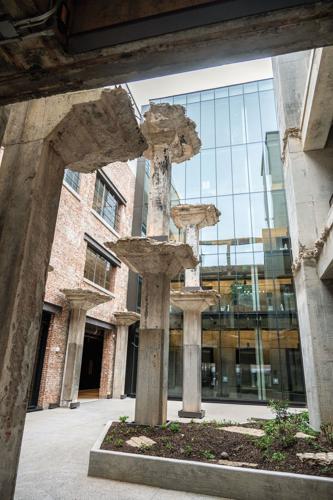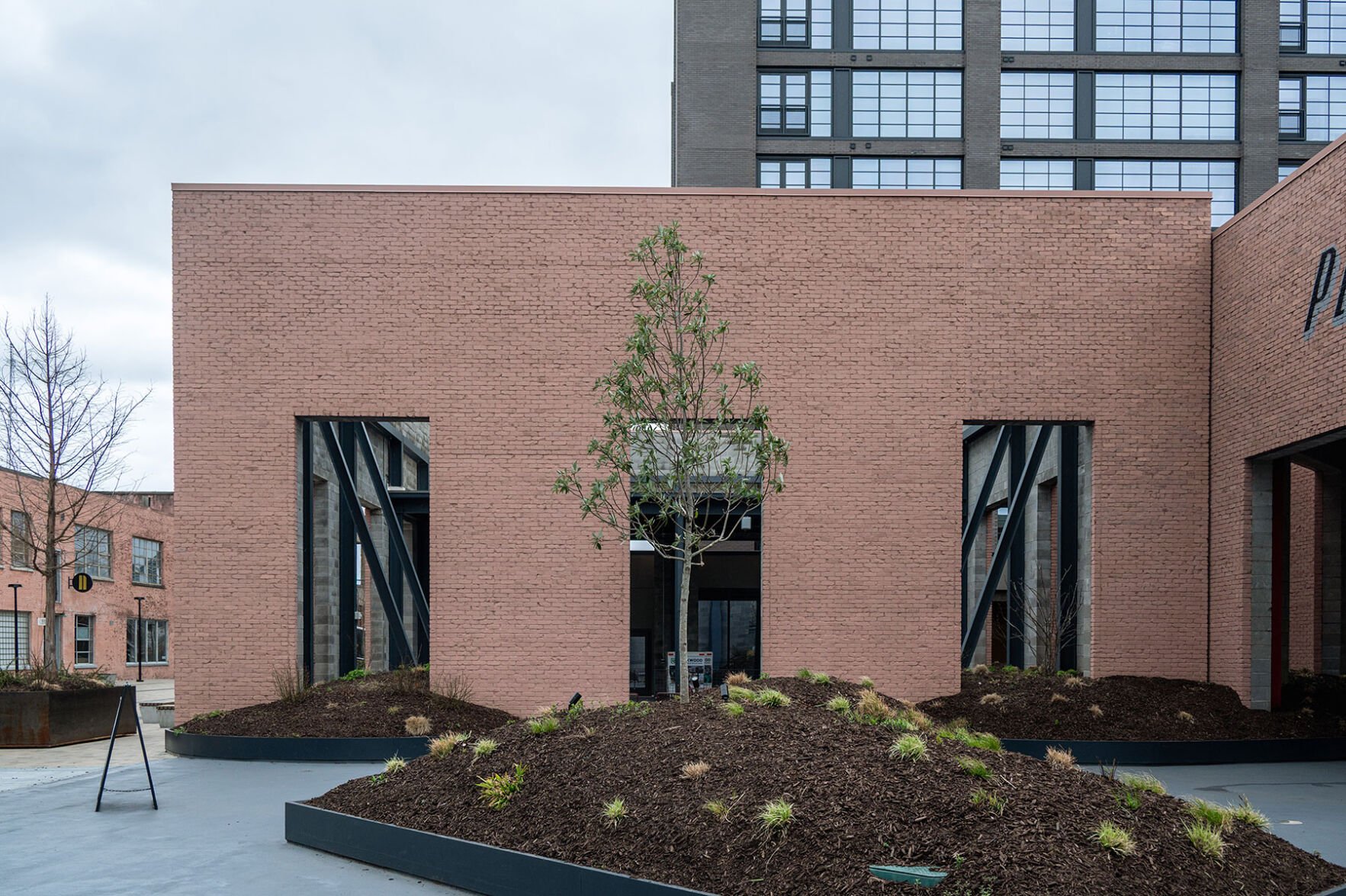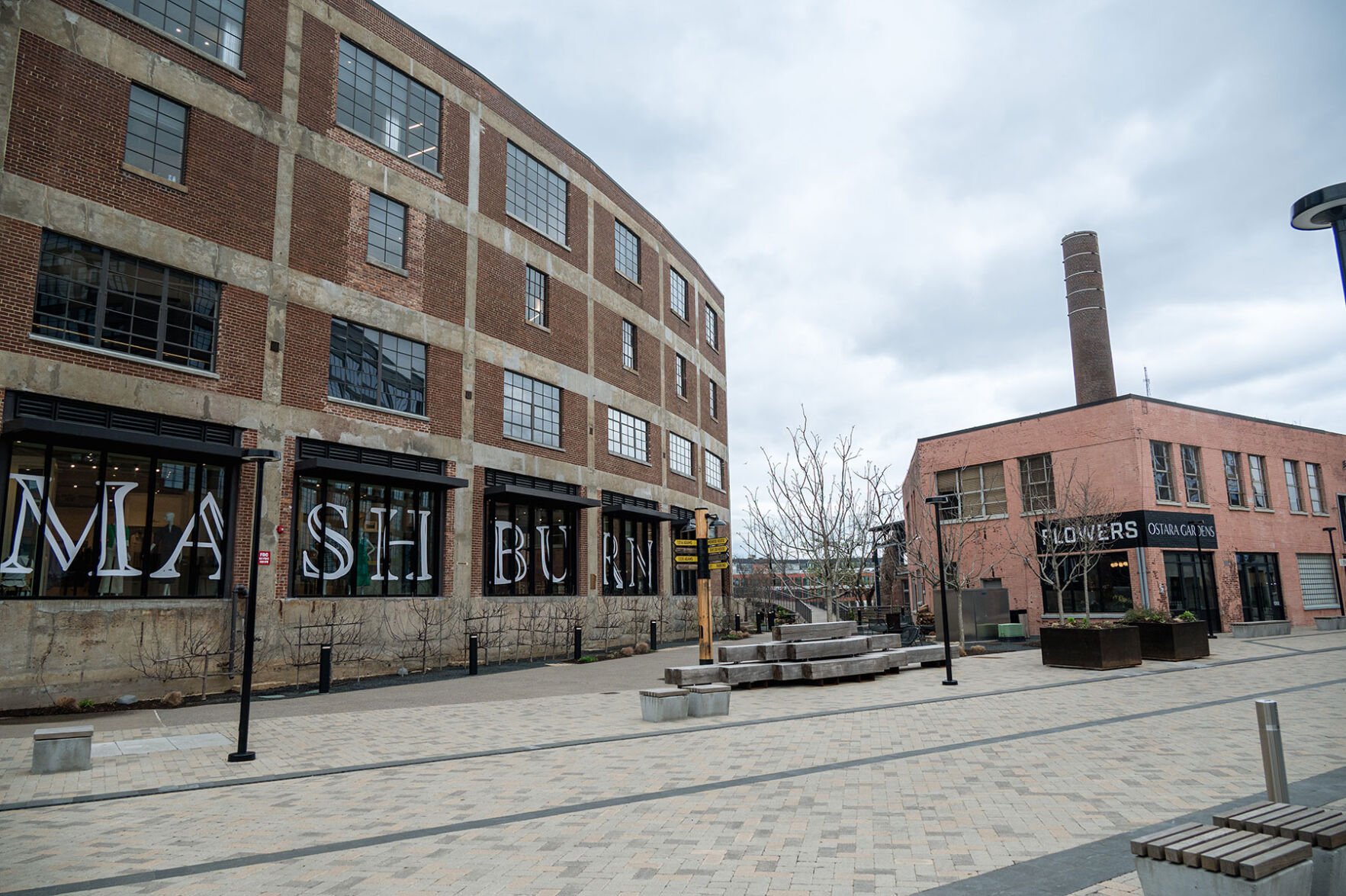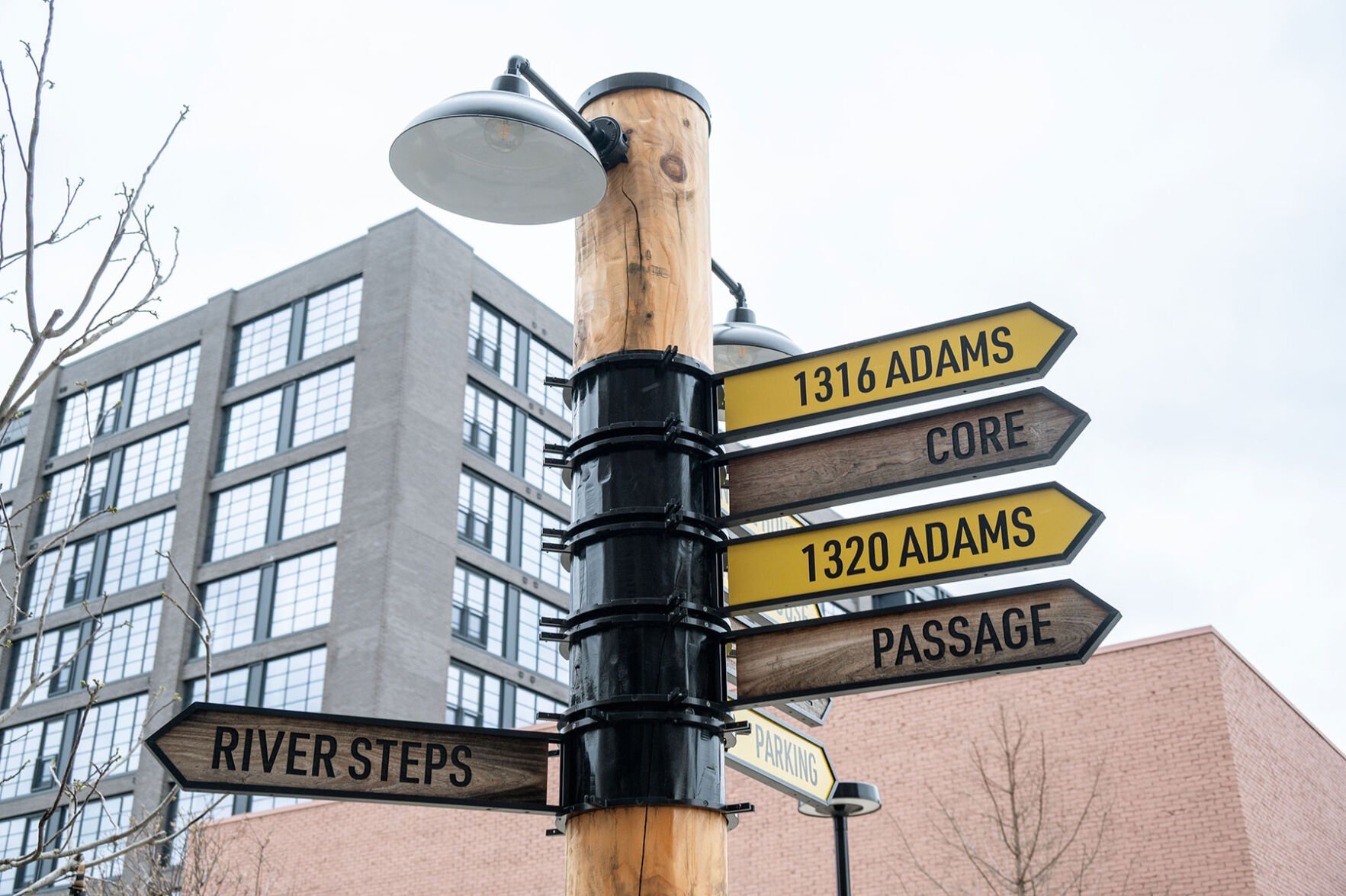Meagan Hall is the development and communications director for the Cumberland River Compact. When she learned that the nonprofit’s offices were moving to Germantown’s Neuhoff District, she wasn’t sure what it would mean for her commute.
Heading home to Donelson from the Compact’s then-offices in the Trolley Barns near downtown could take as long as 45 minutes. She wasn’t looking forward to commuting all the way to Germantown, thinking it would add even more time stuck in traffic.
To Hall’s surprise, the move to Neuhoff District has been a net positive in her life. Now she brings her bike on the train from Donelson to downtown, and then bikes along the Cumberland River Greenway to work, where she uses Neuhoff’s tenant bike valet to lock her bike, change her clothes and go to work. (A shower is available too, but she hasn’t used that yet.) After work, she meets friends, runs errands or rides her bike for recreation.
When Henry Neuhoff brought German immigrants to town to build a meat-processing plant on the banks of the Cumberland River in 1906, he wasn’t thinking about their commute. It would have been unimaginable that the revitalization of his buildings would be heralded as a pinnacle of sustainable design.
Indeed, for some it is hard to reconcile the site’s past as a slaughterhouse and center of industrial Nashville with a nature-centric vision forward. But thanks to the tenacity of those who wanted better for the city, the planet and the river, that’s exactly what Neuhoff District is becoming.
“Working in a place that prioritizes outdoor space, common areas for people to gather, being outside, biking, it’s really refreshing,” Hall says.
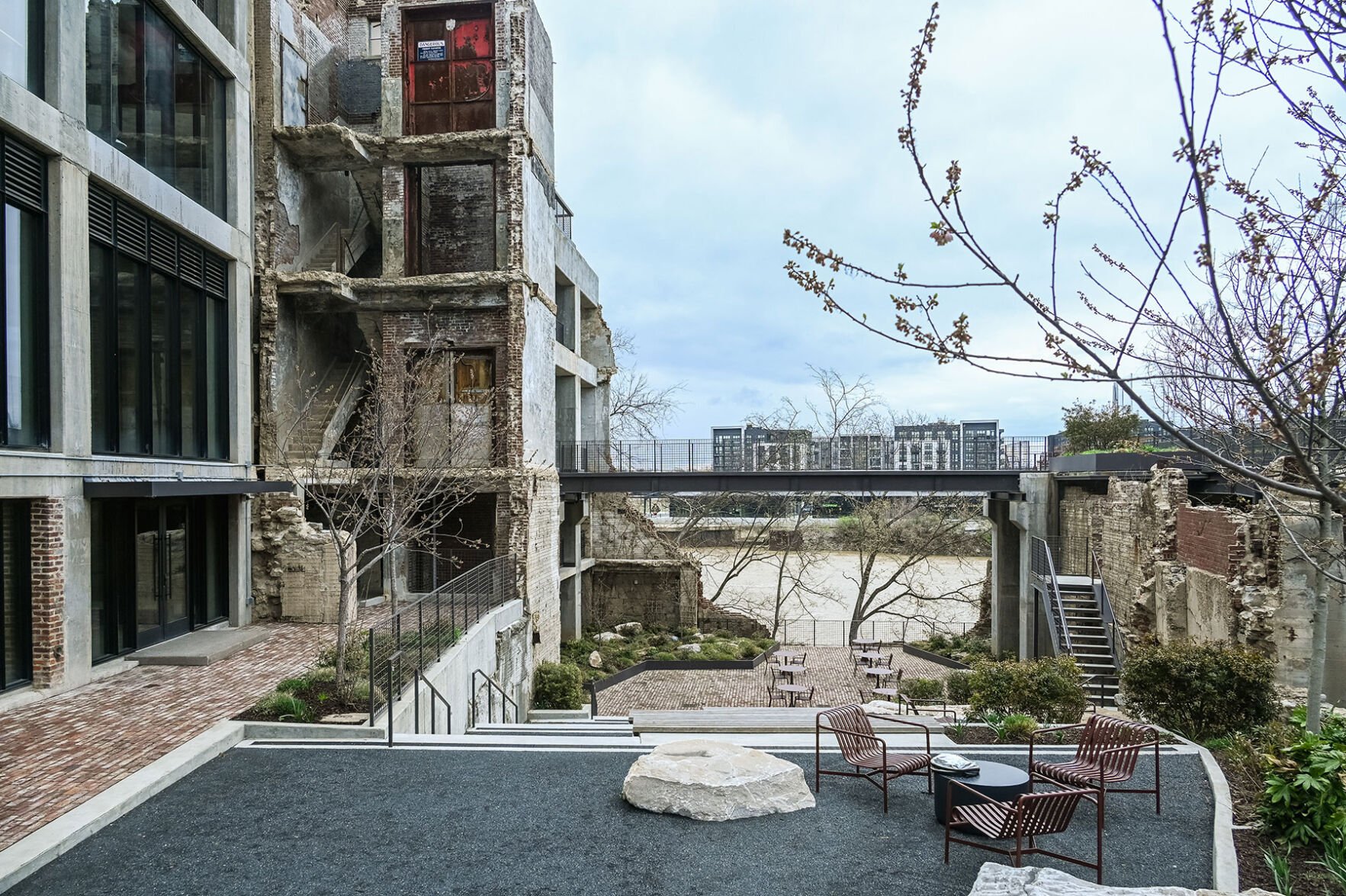
Neuhoff District
Neuhoff’s history is long and complex and has been well-documented. Briefly, when a segment of the McRedmond family purchased the land from other family members in 1998, philanthropist Stephen McRedmond launched an effort to transform the brick buildings, giant columns and ramp system into a mixed-use development with an emphasis on water conservation and sustainability. He understood that architecture like Neuhoff would never be built again, and that its location, closer to the Cumberland River than you are now permitted to build, was unique.
After McRedmond was shot and killed in 2011, his siblings — Linda McRedmond Orsagh and Anita McRedmond Sheridan — and others wanted to preserve his legacy and his vision. Anita and her husband Mark Sheridan moved into Neuhoff (a process that took a year to create a habitable space) because Stephen believed having someone on site was essential to next steps. They converted spaces for artists, including the Nashville Jazz Workshop, and the “pink building,” which became home to John Prine’s writing studio. During this transition time, when many of the hodgepodge of buildings were falling into disrepair, they looked for a developer to help them realize Stephen’s vision. They spoke to many, Orsagh says. And while some thought they might save part of some of the buildings, most thought the idea was cost-prohibitive. Or they just didn’t get it.
Then Jim Irwin heard about Neuhoff. Based in Atlanta and known for his work on adaptive reuse projects like Ponce City Market that have helped transform neighborhoods, Irwin is now president of New City LLC, a real estate company he founded to develop projects with historical character and sustainable aims. Irwin remembers touching one of the brick walls at that first meeting and feeling the building sway. He saw what a mammoth undertaking it would be to transform the 914,000 square feet.
“They asked me, ‘Can you save it?’” remembers Irwin. “And I said, ‘Of course! Who’s telling you that you can’t?’”
From there, New City got to work.
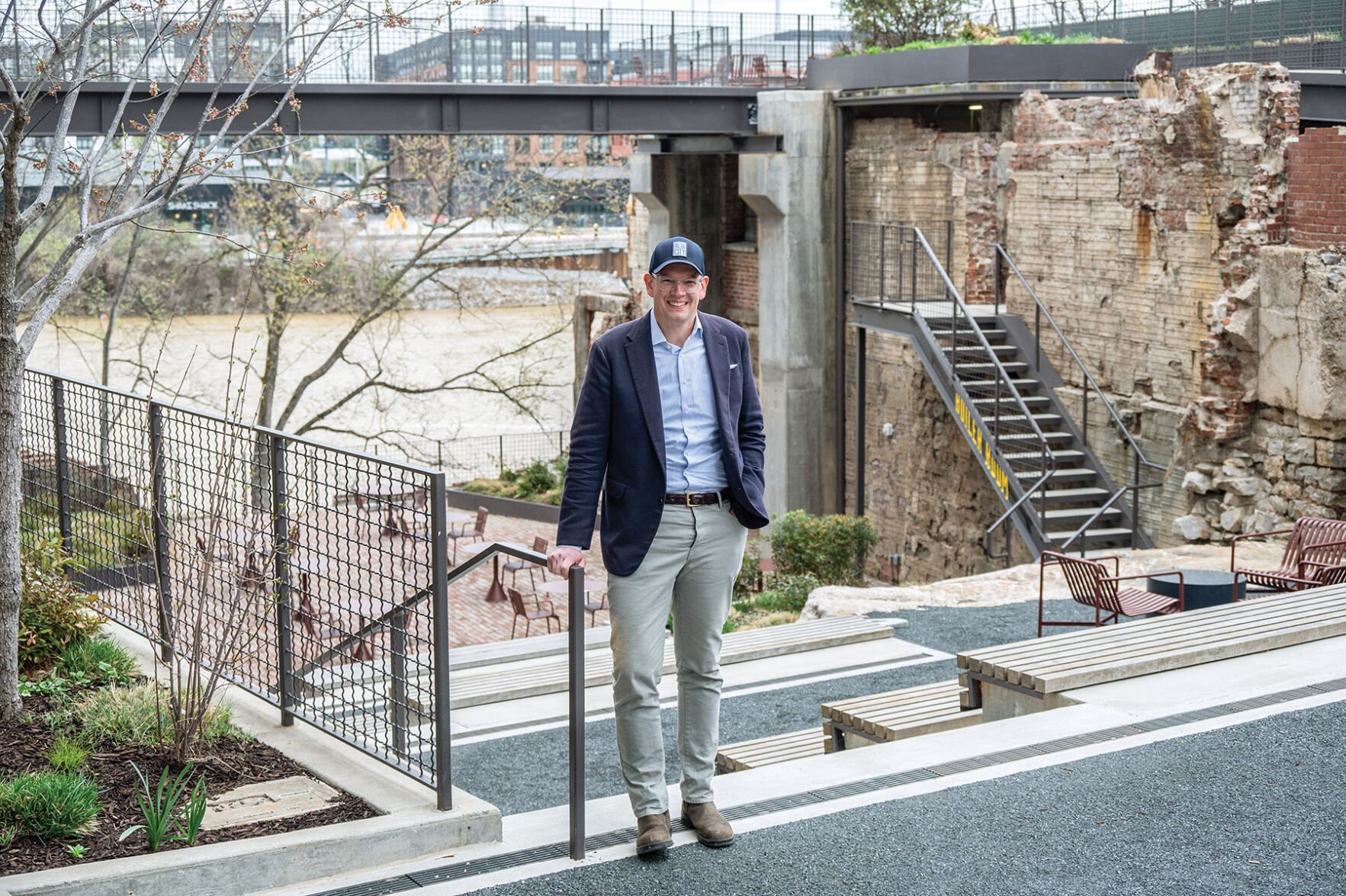
Jim Irwin, president of New City LLC
Different aspects of Neuhoff District now have been awarded various sustainability credentials, from LEED certifications to the National Green Building Standard. Those third-party kudos help demonstrate that the development is as light on the earth as it purports. But what really matters is the way people interact with the space.
Neuhoff prioritizes walking or biking for everyone, not just people who commute to their jobs there, like Hall. There is parking (five stories underground, a feat that required deconstructing the existing building, storing it nearby, excavating 50 feet into the ground, and then reconstructing it identically to what it had been) and electric vehicle charging stages. But you don’t see cars or a lot when you arrive. Eventually, a pedestrian bridge will connect the east side of the river (at the Oracle campus) to Neuhoff on the west. New City is giving the portion of land on which that bridge will stand to Metro government. The hope is for river access and docks for kayaks, paddleboards and dragon boats in the future too.
The Cumberland River Compact staff had been involved with McRedmond family members over the years, discussing ways in which the project could best support the river. When Anita introduced Irwin to the nonprofit, he wanted the organization to relocate to Neuhoff. He thought their perspective and connection to water and environmental stewardship was important. “We don’t want this to just be another office development,” he says. “We want it to really be about taking actual material steps to include important community elements.”
The Cumberland River Compact was founded in 1997 to improve water quality in the river. Over the years, the Compact has launched the Water for Schools initiative, promoting rain barrel and green roof use, No Mow April, depaving and tree planting, and many other programs to build a healthier watershed. With growth, its offices moved from various remote locations to the Bridge Building downtown — where its River Center hosted public River Talks and programming — to the Trolley Barns. At Neuhoff, with views of the river it serves, the Compact will be able to resume River Talks this fall, and its May 15 Hellbender on the River fundraiser will take place at The Platz at Neuhoff, right outside.
“It’s a vision of how you can have a vibrant city that has a lot of people and a lot of energy, and a natural system running through the middle of it,” says Mekayle Houghton, executive director of the Cumberland River Compact. “We don’t have to have one or the other. We can have it both together and figure out how to make it work.”
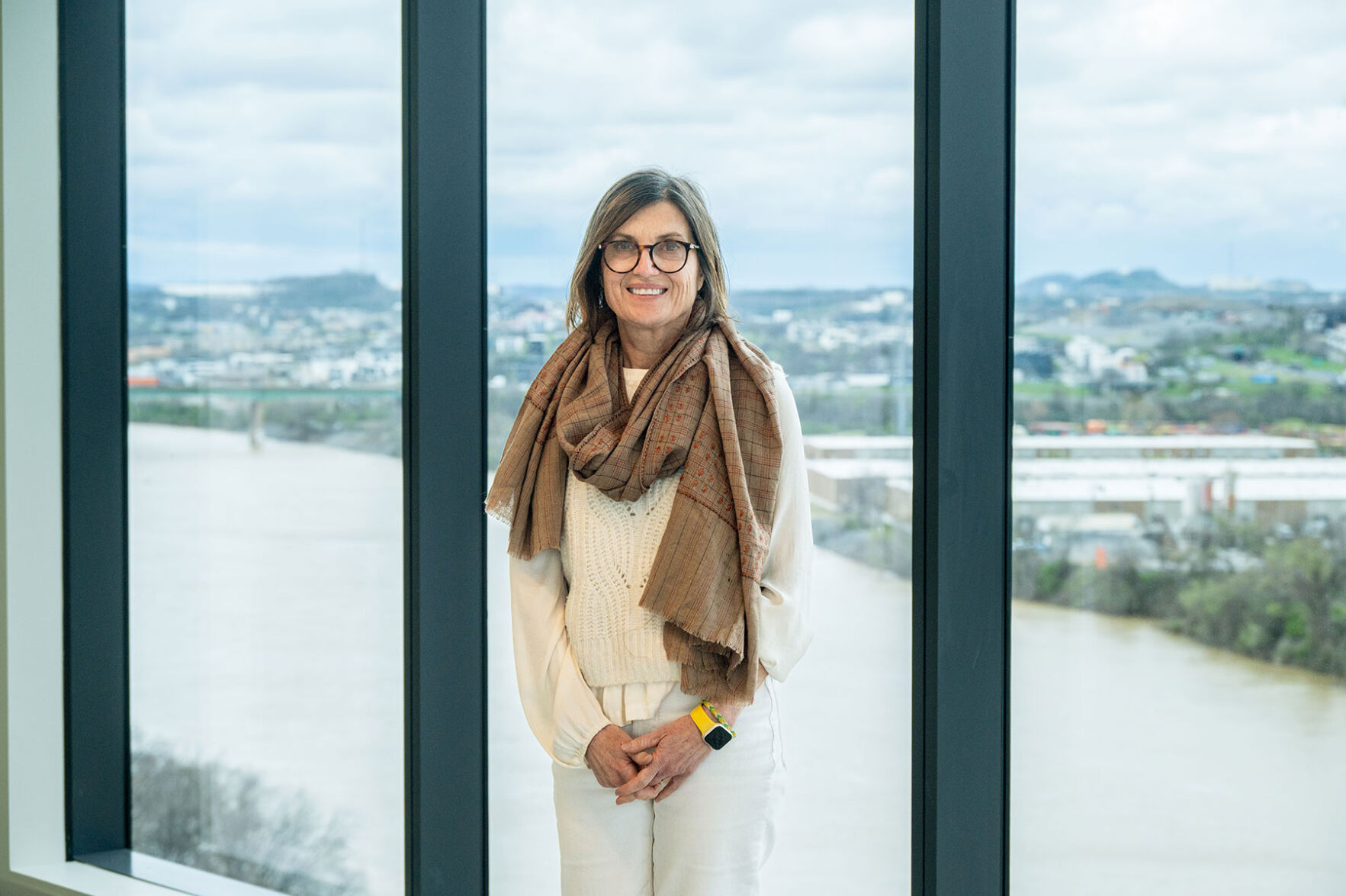
Mekayle Houghton, executive director of the Cumberland River Compact
While many people think of the East Bank across from downtown as the primary public access place for the river — given the current construction there of the Tennessee Titans’ forthcoming Nissan Stadium and the East Bank development — Houghton says Neuhoff already offers the public a convenient option.
“Neuhoff shows that redevelopment — when our riverfront converts from industrial to mixed-use — that we can build in a way that ultimately results in improved water quality,” Houghton says. “The development doesn’t always have to mean we have worse water quality.”
There are connections to the Cumberland River Greenway and places to sit and read among the native-plant gardens and old columns. Architectural elements frame the river, offering views that show off the waterway. That’s rather than views turning away from the river, as was the case in the city for many years.
Much of Neuhoff’s furniture is built from salvaged materials from the site. To leave the columns and other elements, the demolition crew worked meticulously, removing bits of concrete, like a sculpture, rather than smashing it all and moving on.

Neuhoff District
“I think it’s really tragic that if you were put in a blindfold in a grocery store in Seattle and take the blindfold off, and put it back on, and were teleported to a grocery store in Miami and take your blindfold again, you wouldn’t know where you were,” Irwin says. “That’s a function of the modern real estate infrastructure that creates that commoditization. That’s why I love projects like this, because it is definitionally impossible to commoditize this.”
Disclosure: Margaret Littman is a member of the Cumberland River Compact advisory board. She volunteers on certain activities, but does not have a vote or control on Compact decision-making.
Exploring sustainability efforts at Neuhoff District, conservation of the Duck River, restoration of TSU’s Tiger Bay Wetlands and more


